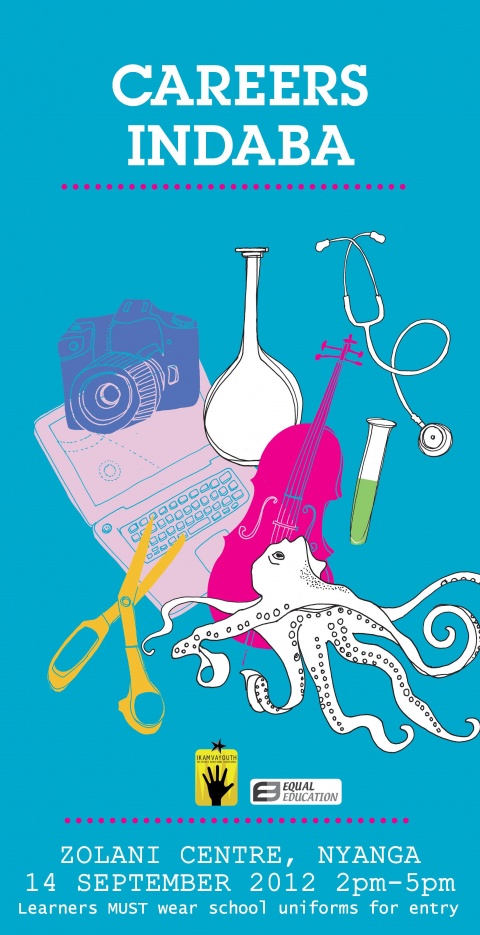
Do you know what you want to do after Matric?
This is a hard decision, one that requires a lot of information and careful consideration, but IkamvaYouth and Equal Education are here to help. We would like to invite you to our 2012 Careers Indaba.
Come join us on the 14 September 2012 in the Zolani Centre in Nyanga (across the road from the Nyanga bus and taxi rank), and is open to grades 8-12.
Address:
The Zolani Centre,
Sithandatu Avenue,
Nyanga
7750
Directions to Zolani Centre
From Cape Town city centre:
Get on to the N2 toward the Cape Town Airport and Somerset West.
At junction 18 take right on to Borcherds Quarry Road (signposted to Nyanga/M22)
Follow this road down to the T- junction at the taxi rank and take a left on to Sithandatu Avenue
The Zolani Centre is on your left immediately and you can turn into the car park straight after the first set of robots.
The purpose of the Careers Indaba is to expose you to new opportunities, provide information about various study options, learnerships and volunteer programs, resources and support structures. In addition the Careers Indaba will offer workshops on CV writing, interview techniques and personal development. These are skills you will need wherever your path takes you!
Why should I come?
Whether you want to continue your studies, start working; find out about on the job training these choices require information and planning. Alternatively do you want to apply for a volunteer program or internship? It is important to start investigating your options now. At the Careers Indaba you will be able to talk directly to the people who are there to guide you in the right direction.
What are my options?
1/ Continue your studies: Do you want to become a teacher, doctor, electrician, scientist, a lawyer, hairdresser, accountant or nurse? All these positions require you to study further. At the Careers Indaba you will be able to discuss your options for universities, colleges, and Further Education Training (FET colleges)
2/ Working & on-the-job training: Do you want to make your own way and be an entrepreneur? Find our what it involves running your own business or learn while working through learnership programmes. At the Careers Indaba you will be able to find out about these options.
3/Volunteering, Internships and Gap Year Programmes: Do you want to spend some time deciding what your next step is, or getting to know yourself and the world about you a little better? Do you want to give back to your community or volunteer and gain valuable experience in a specific field? The Careers Indaba will give you the opportunity to find out more about this.
Spread the word, looking forward to seeing you all there!

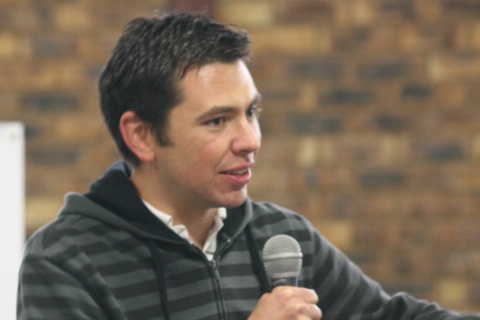

The last day of winter school for the Ebony and Ivory Park branches was filled with mixed emotions. We were sad about the end of winter school, uplifted by the amazing contributions at the talent show, and overwhelmed by a rather daunting part of the programme: “Andrew’s Farewell”. Andrew has been a key ikamvanite since 2009 and his contribution has been so significant that it’s really rather impossible to say goodbye. We have this saying “once an ikamvanite, always an ikamvanite”, and so, rather than bidding Andrew farewell, we spent some time thanking and celebrating him.
Andrew and I first met in 2008, when he became interested in our Operation Fikelela curriculum and its potential use for Siyakhula. He was interested in the IY model, decided to pilot it, and then founded IkamvaYouth Gauteng in 2009. His selfless commitment to realising his vision for the Ebony Park community has been relentless; he has been at every single Saturday tutoring session for three and a half years, and has built not only two branches in Gauteng, but played a key role on natcom, informing who we are and how we do things, and enabling us to become an organisation with a national footprint.
Together with the many learners, tutors and supporters whose efforts he’s inspired and coordinated along the way, Andrew has made an incredible impact. In 2011, the Ebony Park branch achieved a 94% pass rate and 100% post school placement, with 45% at universities, and last year they reached a 100% pass rate and 83% access to tertiary.
Not only has Andrew’s work fundamentally changed the lives of the people he’s worked with, but he has established something that will keep on changing many lives. The individuals who were learners during Andrews time will become the tutors who will support more learners to reach similar heights.
But this work is not easy, and it’s this, even more than the outcomes that I want to thank Andrew for. Andrew has essentially been volunteering for IkamvaYouth all of this time. He has a full-time job running his own NGO, and has sacrificed massive amounts to create this beautiful home for all of us. And he even managed to study and win awards in addition to his two full time jobs! He has sweated the small stuff: filling out attendance, capturing data, making sandwiches and dealing with the un-fun aspects of this work. And he’s also been a visionary leader who’s inspired hundreds of people to change the world.
So I’m not going to say farewell. I know that our organisations will continue to collaborate and that ultimately we are still working together towards the same goal:
The fact that 2 million of the 2.8 million South Africans Not in Education, Employment or Training (NEETS) haven’t passed matric tells us something about how to fix this problem. What IkamvaYouth and Siyakhula are working towards is ensuring that young South Africans don’t become NEETS but rather IETS. (“Iets” means “something” in Afrikaans.)
So what IkamvaYouth and SEF and everyone in that room on the last day of winter school, led by Andrew, is doing, is ensuring that ikamvanites become iets; become something. Ikamvanites become something so great that very soon they can in turn help other learners to become something. And what ikamvanites are going to become and are becoming already, are the leaders of the country. Because the generations before us do not know how to fix this problem. The education crisis is so huge and so massive that they are scared by it. But we do know how to fix it. And instead of wringing our hands and talking about how we need to work together to fix things, we’re getting on with it.
That’s what Andrews been doing for the last 4 years, and, through SEF, is going to continue doing for the next many years, and so this isn’t a goodbye but a huge thank you. For your leadership, your volunteerism, your inspiration, your selflessness, for challenging us, for pushing us, and for sharing all you know with this amazing team of people who will continue with the amazing work you started.
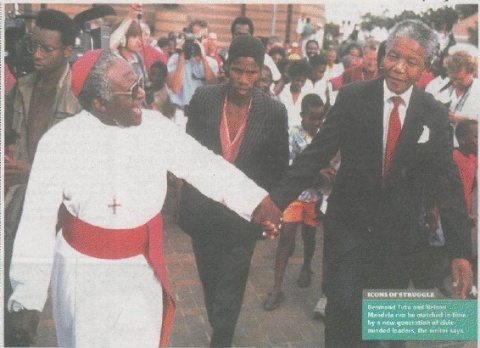
I had the good fortune of being in America at the time of President Obama’s inauguration. It was a time of high hopes and intense optimism. During my travels I came across a quote from Obama’s Harvard Law School professor Christopher Edley Jr. that made a significant impression on me.
“So the first generation comes through, and they say great, you get your law degree and you go out and you be a troublemaker in the black community. Second wave comes through, and aha, now I’ve got opportunities in business. Third wave comes through, and maybe we’ve gotten to the point where we can get somewhere with mainstream politics, not protest politics.”
The quote is obviously related to the Civil Rights Movement, which began to win freedoms for America’s minority black community in the 1960s, but it seemed to me to offer hopeful parallels for South Africa where there is much noise about a leadership crisis. Many despair that we won’t ever again know leaders of the calibre of Nelson Mandela (who did indeed get his law degree and start causing trouble) and Archbishop Tutu. All around me I hear people asking with urgency, “Where will our leaders come from?”
As I reflect on this quote, it seems clear to me that these icons, and many others like them, were South Africa’s first wave of activist leaders who won freedom in the 1990’s. They opened the doors of opportunity for the second wave, many of whom have rushed to the feeding trough that business and politics are perceived to be. It is understandable that some are discouraged that the children of yesterday’s activists are today’s tenderpreneurs and Mercedes-driving politicians, but there is another generation who is coming up behind them.
These are young people who have used the opportunities afforded them to get good education first and foremost. Secondly, like President Obama, they are choosing to use their education to assist others. They are considering public service and other avenues where they can make a difference.
In this regard, I wonder if we are not 30 years behind the United States and will only truly see this third wave emerge in full force when they are midcareer, about 25 years from now. I know that this third wave is gathering momentum because I work alongside these young 20 year olds every day at the Tertiary School in Business Administration (TSiBA). Many lament the quality of education in South Africa, but when I go to inter-university events, it is strikingly clear that the demographic profile of university students has changed dramatically.
In an attempt to share the optimism that I gleaned from my travels in the States, I initiated a book called The Search for Tomorrow’s Leaders and set out to interview others who, like my colleagues and I, are hard at work developing tomorrow’s high profile leaders. I wanted to challenge the belief that there is a leadership crisis by profiling the third wave that is emerging. I wanted to learn what others who work in leadership development know because I am convinced that South Africa is rich in many kinds of positive leadership, at all levels in our society.
Indeed, iconic and positive leadership has been one of the gifts that our country has offered to the world. As a nation we know something about the journeys that lead to significant leadership and what it takes to develop this.
My team and I interviewed university Vice-Chancellors and high school principals, politicians and business people, activists and social entrepreneurs. Some were well-known names like Jonathan Jansen and Ferial Hafajee. Most were ordinary South Africans who have committed themselves to nurturing our country’s next generation.
Although we set out to interview “thought leaders”, we quickly started to think of our interviewees as “thought and action leaders” for indeed this was one of our most fascinating findings. We were surprised to learn that even the most well-established leaders did not think of themselves as leaders. Or, if they did, it was a recent and still somewhat uncomfortable change in their sense of identity. None of the people that we interviewed set out to be leaders. Instead, they repeatedly described seeing a need and rising to the challenge.
We came to realise that perhaps a more accurate description of leadership is people who are willing to take action to address the challenges that they see around them. You don’t need to be a politician to be a leader, and this is the point that Mamphela Ramphele’s Citizen’s Movement for Social Change is trying to make. We need to stop thinking of ourselves as subjects who are at the behest of our “leaders” and start becoming active citizens.
Our book is filled with examples of South Africans who are doing just that. They may not think of themselves as leaders but they are, and once we began looking for them we were amazed to find how many reasons there are for hope. Indeed everyone who works in the field of leadership development describes how hopeful they are.
Perspectives: The Search for Tomorrow’s Leaders seeks to put paid to the despair that I sense when people talk about “leadership” and “youth”. It may be that we are feeling the full effects of the second wave in South Africa, but behind them another wave is gathering momentum. These educated and ethical leaders, who are deeply committed to our country, are slowly entering the mainstream.
Get your copy of Perspectives at the Book Lounge in Roeland Street, and read interview about IkamvaYouth which is featured in the book on the DGMT site.


Since the earliest days of IY’s existence, ikamvanites have dreamed of extending our reach to the province from where many of us originate and – given the abysmal academic performance and other challenges – we’re clearly needed. We’re now thrilled to announce that, thanks to key IY supporters including Capitec and the Learning Trust, IkamvaYouth is looking to establish the first of hopefully many branches in the province.
Co-founder of IkamvaYouth, Makhosi Gogwana, is based in the province and is the backbone of the Chief Directorate for Local Economic Development support to municipalities. He’s very keen to support the organisation’s expansion to many areas, and says “I am always thinking about the work of IkamvaYouth with huge satisfaction… I salute all of you.”
I was fortunate to meet with many other individuals and organisations doing very interesting and inspirational work in Grahamstown in February, and due to the enthusiastic and supportive response from each of them, we have decided to establish the first EC branch in Grahamstown 🙂
Rhodes University’s Centre for Community Engagement is a central collaborative hub for community-based organisations, integrating student volunteerism and service learning opportunities. Di Hornby and Margie Keeton expressed their support for the IY model, and affirmed the need for our programme (and, we’re all hoping, replicated results!) in Grahamstown. The Centre’s report on Community Engagement provides a useful and inspiring overview of the centre and its partners’ work.
I also met with Shireen Badat from Upstart, and was very excited to learn about her talented and hardworking grade 10s who need ongoing academic support in order to improve their academic results and especially their performance in matric. Have a look at the learners’ latest edition of the awesome Upstart paper: Youth Speaking to Power.
Jan Blom came all the way from Nemato (The Nelson Mandela Township, between East London and PE) to meet with me, and his incredible story affirmed the commitment and passion that exists in the area. His organisation, Nemato Change a Life, is doing incredible work in providing ongoing and long-term support to the youth of the area, enabling them to access opportunities and improve their lives. They also place great emphasis on commitment, and we spoke about ways to integrate Nemato Change a Life’s sports programmes, and integrating IY’s academic and career guidance programmes for the Nemato youth.
Finally, I met with Anna and Rob from the Village Scribe Association, where they introduced me to Awarenet. Most fortuitous, as we’ve been trying to figure out a way for ikamvanites to leverage social networking on the ikamvanitezone in a way that’s distinct and separated from the general noise on Facebook. Our developers have since been working away to connect Awarenet with the Zone, and it’ll very soon be available to every ikamvanite to connect, share and learn with each other between branches and indeed with other learners across the country.
It is clear that each of the organisations I met share our values and we are very much looking forward to linking and collaborating with them. Next steps for us are hiring a regional coordinator, finding a venue and securing additional funding.
With Rhodes as a welcoming partner and the many organisations keen to collaborate, we’re feeling very positive about taking the first steps in establishing our first IYEC branch. Clearly, the real challenge that we will address in the coming years is extending the IY model into rural areas, and our plan is for the Grahamstown branch to become a central hub from which far further-reaching activities will emanate.
Nemato, Axium and the Village Scribe Association are all doing really interesting work in challenging rural environments, and IY is looking forward to learning from, partnering with and eventually extending the model so that it’s no longer limited by the need for proximity to university campuses for volunteers. We’re looking forward to leveraging technology and the experiences of those who’re currently engaged in improving education in rural areas, so watch this space!

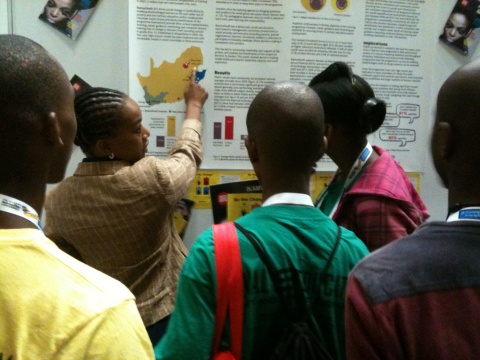
The first day of the Basic Education Conference was pretty exhausting. Ikamvanites were there at the crack of dawn to put up our poster in the rather sad corner we’d been allocated. Thankfully, for those who may have missed us (and the many who couldn’t make it to Durban or pay the huge registration fee), it’s available here for download. We’re really grateful to @ideainaforest for making it so beautiful, and are proud to see our great results represented visually.
Andy Hargreaves’ keynote was great. While he wasn’t as funny as he was at Quest (the Canadian conference which put IkamvaYouth on the main stage and not in the corner ;P) his talk was insightful and smart. He spoke about the challenges of a target-driven education model, and the fact that it takes capacity to build capacity. He pointed us to the three things on which we should focus: (i) building human capital and capacity; (ii) building our sociap capital (how well we work together as a community) and (iii) building our decisional capital (our capacity to make judgements).
Most of the presentations detailed, as usual, how badly we’re doing as an education system. Whether speakers were talking about the matric results, the drop-out rates, the lack of parental involvement, literacy and numeracy results for lower grades or the South African system as a whole, the general consensus is that things are really bad. However, while it’s always useful to have a richer understanding of the challenges before us, I’m hoping the conference will move on from detailing what we already know, and focus instead on the solutions we need.
In my search for solutions at the presentations, I was disappointed to hear various academics describing small pilot studies which, while interesting, are not yet anywhere near the stages of replication or scale. More disappointing were speakers who spoke about their successfully scaled projects in very general and vague terms, without explaining their indicators for success, never mind their results.Equal Education’s campaign provided a successful short-term solution to the problem whereby 20% of learning time is lost due to latecoming. We need to look at how to scale and continue this success over the long term.
I began to feel a glimmer of hope listening to Martin Prew describe the dramatic transformation of the Soshanguve district, which achieved phenomenal results at a relatively low cost. However, the depression returned when I realised that the first presentation with a smack of solution was a story that ended over ten years ago. Martin explained the three reasons for the implementation being canned: “politics, politics, politics”. The many ways in which various forms of “politics” are obfuscating efforts came up a lot. It’s no wonder that Equal Education has had enough and is taking the big step to sue the DoE.
I had more luck in my search for solutions at the posters: Axiom is making huge strides in rural education, and TEACH South Africa is contributing to quality education in township and rural schools by providing high-quality, motivated and inspirational young teachers. The Manong Youth Developers outlined their results over a few years, and SAEP’s poster detailed the phenomenal results of its bridging year programme: 88.5% matric pass, 96% improved results with an average of 26.4% per student over all their exams. And 83% access to tertiary or FET. The poster explained that SAEP is currently doing a study and will be sharing the results to help others design similar programmes. The poster presentations also included tools for helping children learn language through guided play (Geordie Muller) and for teaching different forms of writing by linking the process to the methodology of cooking (Ms Jacky Steytler Lamer from Ugie High School).
Perhaps I chose the wrong tracks at the wrong times. Or perhaps day one was focused on setting the scene for the great collaborative effort to “open the doors of quality education for all”. With all the leaders in education under one fancy convention centre roof for two more days, here’s hoping that we’ll make the most of this great opportunity to build our social capital and get moving with smart solutions.

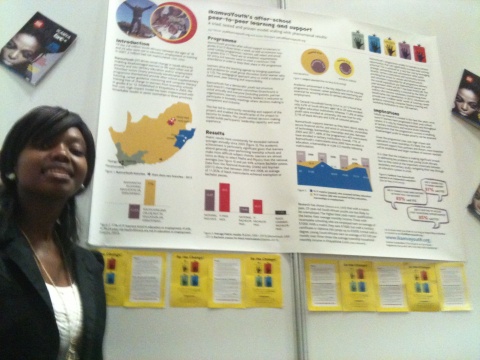

Over 320 abstracts were submitted to the SA Basic Education Conference from teachers, principals, academics, government, non-government organisations, and the corporate sector, and IkamvaYouth’s submission has been selected as a poster presentation on 2 April. Zamo Shongwe and Joy Olivier will be representing the ikamvanites at this event, and are looking forward to learning, sharing and connecting with the conference delegates from all sectors. Professor Metcalfe, the conference chair, said that “it is very encouraging to see the creative and innovative ideas coming from teachers and principals at the coal-face of basic education”, and we’re looking forward to being a part of it.
IkamvaYouth’s poster presentation will be uploaded here in the coming days, together with background information, references and acknowledgements. We hope that readers will engage with it and send us your comments and questions via the facebook comment functionality below.











 Lloyd Lungu
Lloyd Lungu